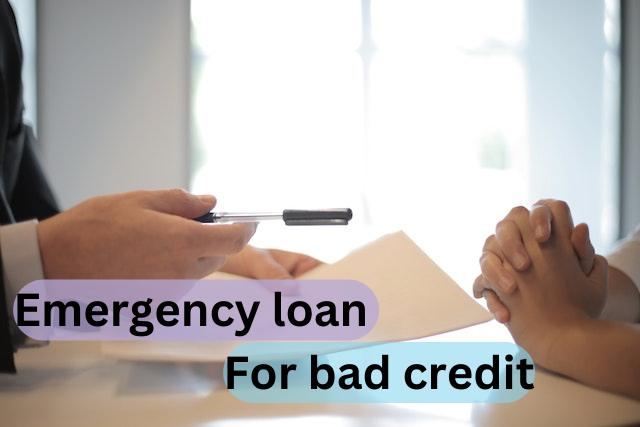Are you tired of being held back by a poor credit score? “emergency loan for bad credit” Don’t worry, because we have just the solution for you! In emergency loan for bad credit blog post, we’ll reveal the ultimate secret to rebuilding your credit – an emergency loan specifically designed for individuals with bad credit. Whether it’s unexpected medical bills or mounting debts that have led to financial turmoil, our comprehensive guide will walk you through each step towards regaining control and boosting your creditworthiness. Say goodbye to endless rejections and hello to a brighter future filled with financial opportunities – let’s dive in!
Introduction to the importance of credit score and its impact on financial stability
Introduction to the importance of credit score:
Credit score is a three-digit number that represents an individual’s creditworthiness. It is a numerical expression based on their credit history and current financial situation, which helps lenders determine the risk involved in lending money to them. A high credit score indicates responsible borrowing behavior and reliable repayment capability, while a low credit score may indicate the opposite.
The importance of having a good credit score cannot be overstated. It plays a crucial role in our financial stability and can greatly impact our lives in various ways. In emergency loan for bad credit section, we will delve deeper into understanding why maintaining a good credit score is essential and how it can affect our financial well-being.
Impact on financial stability:
Having a good credit score makes it easier for individuals to access loans from banks or other financial institutions. Lenders consider your credit score as one of the primary factors when deciding whether to approve your loan application or not. A higher credit score not only increases your chances of getting approved but also enables you to secure better interest rates and terms, saving you money in the long run.

Similarly, having a good credit score also improves your chances of getting approved for a new credit card with favorable terms such as lower interest rates, higher spending limits, and attractive rewards programs.
Renting an apartment or house has become increasingly difficult without a good credit score. Landlords use your payment history as an indicator of how likely.
Understanding what a bad credit score is and how it affects your financial options
A bad credit score can have a significant impact on your financial options and overall financial health. It is important to understand what a bad credit score is and how it can affect your ability to access credit and other financial opportunities.
A credit score is a numerical representation of an individual’s creditworthiness, which is calculated based on their past borrowing and repayment behavior. Emergency loan for bad credit score is used by lenders to assess the risk of lending money to an individual. A bad credit score typically falls within the range of 300-579 on the FICO scale, while a good or excellent score ranges from 670-850.
There are several factors that contribute to a bad credit score, including missed or late payments, high levels of debt, collections accounts, bankruptcy, and foreclosures. These negative marks stay on your credit report for up to seven years, making it challenging to improve your credit score in the short term.
How Does a Bad Credit Score Affect Your Financial Options?
Having a bad credit score can limit your access to traditional forms of lending such as personal loans, mortgages, and credit cards. Lenders view individuals with low scores as high-risk borrowers because they have demonstrated difficulties in managing their debt in the past.
Emergency loan for bad credit means that you may be denied for loans or offered higher interest rates if you do get approved. Additionally, having a bad credit score can also make it challenging to secure rental housing or even affect your chances of getting hired for certain jobs since some employers
The benefits of using an emergency loan to rebuild your credit score
Rebuilding your credit score can seem like a daunting task, especially if you have a history of bad credit. However, there is a solution that may help you improve your credit score quickly – an emergency loan. While traditional loans may be difficult to obtain with bad credit, emergency loans are specifically designed for individuals who are in urgent need of financial assistance. In emergency loan for bad credit section, we will discuss the benefits of using an emergency loan to rebuild your credit score.
One of the major benefits of using an emergency loan to rebuild your credit score is the quick and easy approval process. Unlike traditional loans that require extensive paperwork and a good credit score, emergency loans have a more lenient approval process. Emergency loan for bad credit means that even if you have a low credit score or no credit history, you can still qualify for an emergency loan.

Making timely payments on your emergency loan can help you establish a positive payment history which is crucial for improving your credit score. Payment history accounts for 35% of your FICO credit score, making it one of the most important factors in determining your overall creditworthiness. By consistently paying off your debt on time, you can demonstrate responsible financial behavior and boost your credit score.
High-interest debt can significantly affect your ability to improve your credit score as it increases the amount of money owed and makes it harder to make timely payments. Using an emergency loan to consolidate high-interest
How to qualify for an emergency loan for bad credit
If you have a bad credit score, you may feel like your financial options are limited. However, in times of emergency, an emergency loan for bad credit can provide much-needed relief. These loans are specifically designed for individuals with low credit scores and offer a lifeline during unexpected financial crises.
But how do you qualify for an emergency loan with bad credit? Here are some steps to help you successfully secure the funds you need:
- Understand Your Credit Score: Before applying for any type of loan, it is crucial to understand your current credit score. Emergency loan for bad credit will give you an idea of where you stand and what kind of interest rates and terms to expect when applying for an emergency loan. You can check your credit score through various online platforms or by requesting a free copy of your report from the three major credit bureaus – TransUnion, Equifax, and Experian.
- Research Lenders: Not all lenders offer emergency loans for bad credit, so it is important to do your research and find reputable lenders who specialize in these types of loans. Look for reviews and ratings online to ensure that the lender has a good reputation and offers fair terms.
- Meet Eligibility Requirements: Emergency loans typically have less stringent eligibility requirements compared to traditional loans, but there are still some criteria that must be met. emergency loan for bad credit may include being over 18 years old, having a steady source of income, and providing proof of identification.
Tips for responsibly using an emergency loan to improve your credit score
Using an emergency loan can be a helpful tool for improving your credit score, but it should be used responsibly and with caution. Here are some tips to keep in mind when using an emergency loan to rebuild your credit score:
- Understand the purpose of an emergency loan: Before taking out an emergency loan, it’s important to understand its purpose. Emergency loans are meant to provide temporary financial relief in urgent situations, such as unexpected medical expenses or car repairs. They should not be used for unnecessary purchases or expenses.
- Borrow only what you need: When applying for an emergency loan, it may be tempting to borrow more than you actually need. However, borrowing too much can lead to higher interest rates and larger monthly payments, which could make it difficult for you to repay the loan on time. It’s important to carefully assess your financial needs and borrow only what you can afford to pay back.

- Make timely payments: One of the most important factors that determine your credit score is your payment history. Making timely payments on your emergency loan will help improve your credit score over time. Be sure to set up automatic payments or reminders so that you don’t miss any due dates.
- Don’t use the entire amount for one purchase: It may be tempting to use the entire amount of your emergency loan on one big purchase or expense, but emergency loan for bad credit can negatively impact your credit utilization ratio – the amount of available credit you’re using at any given time – which is also a key factor in determining
